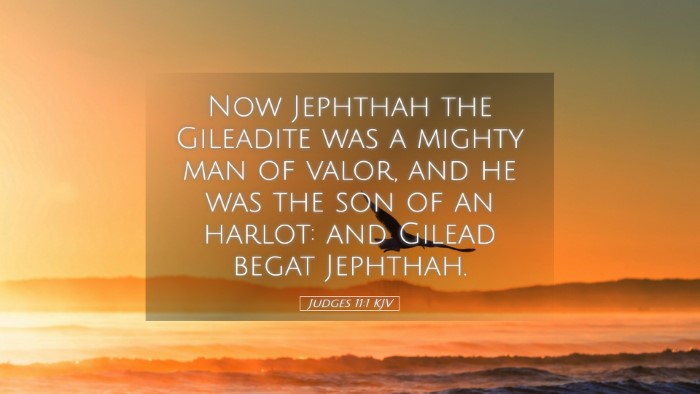Commentary on Judges 11:1
Judges 11:1 presents a significant figure in the biblical narrative, Jephthah, whose story raises profound theological and moral questions. Below is a concise summary derived from public domain commentaries, specifically integrating insights from Matthew Henry, Albert Barnes, and Adam Clarke to shed light on this passage.
Text of Judges 11:1
Now Jephthah the Gileadite was a mighty man of valor, and he was the son of an harlot: and Gilead begat Jephthah.
Contextual Analysis
The Book of Judges chronicles the cyclical nature of Israel's history during a turbulent period marked by moral decay and apostasy. Jephthah emerges as a judge during a time of oppression from the Ammonites, and his narrative begins with a stark introduction highlighting his lineage and reputation.
Character of Jephthah
1. A Mighty Man of Valor
- Military Prowess: Jephthah is described as a "mighty man of valor," indicating his status as a warrior. This phrase suggests that he possessed both courage and significant military skills.
- Leadership Qualities: Jephthah's valor implies that he was admired and respected among his peers. As Barnes notes, leadership arises in times of crisis, and Jephthah's military capabilities positioned him to confront the Ammonite threat.
2. Stigmatized Origins
- son of a Harlot: The mention of Jephthah's mother being a harlot highlights the stigma associated with his birth. Matthew Henry emphasizes that despite his questionable lineage, God's purpose for Jephthah transcends human judgments.
- Overcoming Background: This aspect of his identity underscores a theological theme: God equips and calls individuals from diverse and often marginalized backgrounds. Adam Clarke eloquently articulates how God can use those whom society may overlook or diminish.
Theological Themes
1. Divine Sovereignty and Human Choice
- Jephthah’s rise to leadership illustrates the interplay between divine sovereignty and human agency. Despite his origins, he is chosen by God to lead Israel to victory, demonstrating that God’s selection often diverges from societal expectations.
2. Redemption and Purpose
- The narrative speaks to the possibility of redemption and purpose in God’s plan. Jephthah's story invites us to acknowledge that God can transform even the most challenging beginnings into powerful testimonies of His grace.
Application for Today
This verse resonates with various audiences, encouraging pastors, students, and theologians to reflect on the following:
- Inclusivity of God's Call: The Church must remember that God calls individuals from all walks of life, emphasizing inclusivity in ministry and leadership.
- Pursuit of God’s Will: Jephthah’s example teaches the importance of seeking God’s will, even in the face of societal ridicule or disadvantage.
- Leadership Amidst Adversity: Life's challenges can mold individuals into leaders. Jephthah's valor in confronting adversity can inspire believers to face their struggles with faith and courage.
Conclusion
Judges 11:1 captures the essence of God’s use of human instruments, regardless of their pasts or societal labels. The life of Jephthah serves as a profound reminder that God's plans often defy human perspectives. It challenges modern believers to recognize their identity in Christ and to embrace the call to serve, lead, and overcome adversity, empowered by the One who calls them.


